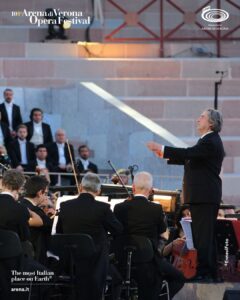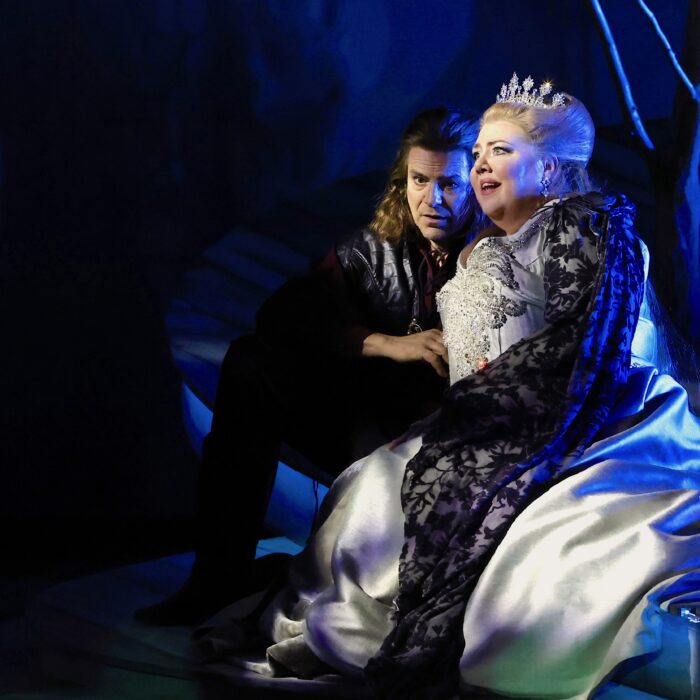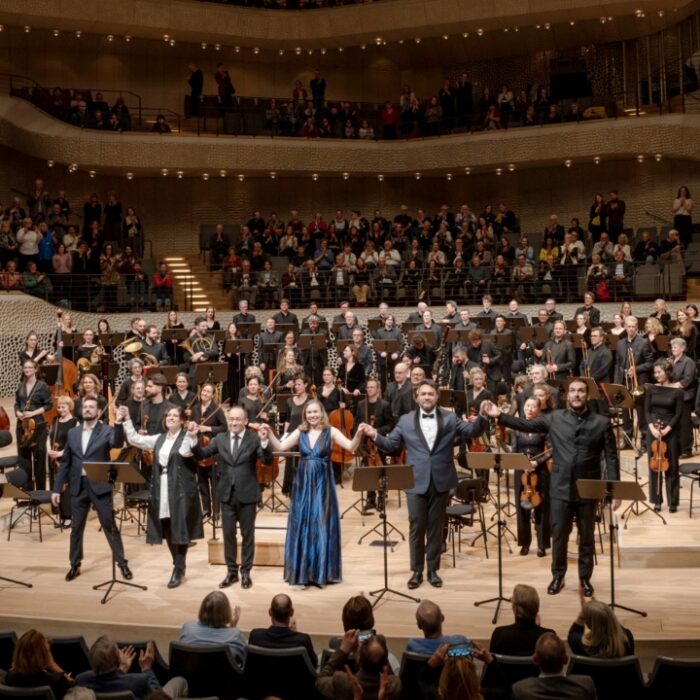
Editorial: Riccardo Muti Claims That Opera is Beyond the Singing
What We Shouldn’t Miss About Arena’s Gala ‘La Grande Opera Italiana Patrimonio dell’Umanità’
By Polina LyapustinaIn December 2023, Unesco announced its decision to include the most Italian of all arts, that explodes with passion and is powered by mastery in music, singing, drama, and design, the Italian Opera, or simply Lirica as it is called in Italy, under its category of Intangible Cultural Heritage. This summer, the Arena di Verona Foundation invited all lovers of the genre to celebrate this occasion at the lavish gala concert funded by the Ministry of Culture of Italy.
Ten thousand people in the antique amphitheater, 164 musicians and 314 chorus members on stage, and 70 dancers along with some 1,000 staff members backstage in the very heart of Verona. Everyone falls silent as a presenter begins their speech, expressing tons of excitement about the night and high-minded, albeit well-deserved, praises for the one and only Maestro Riccardo Muti.
The great conductor appears on the stage in his usual simple black jacket, bows to the audience, and immediately starts communicating with the orchestra. He seems not to care about the monarchist tradition of saluting the President of the Republic, who arrives when all is ready and set — Muti knows perfectly well that his, so loudly celebrated, time on stage was strictly dependent on the arrival time of the Mattarella’s car and his endless walk down the red carpet. A short warm welcome to the government and without waiting for the crowd’s cheering to cease, the Maestro begins with the Italian National Anthem.
Viva l’Italia!
Inno di Mameli (the Italian Anthem) is a song of unity over centuries of struggles for love and prosperity for millions of hearts and souls, known and sung by every Italian. But in this country, it could be (and even this night, they talk about it) replaced with any other sincere and passionate song once a choir of Italians would sing it from their hearts. Italian voices are what make the song an anthem.
Louder and stronger, more loving and united in every heartbeat, every human voice that is no weaker than the choir, every conductor’s movement, and the warm wave of applause. This is their anthem. At this moment, you understand what a huge responsibility rests on the conductor’s shoulders this evening. To celebrate an Italian Opera with the Italian nation means to play the music in a way so that every next piece would become an extension of the anthem and Italian unity.
That night in Verona, Maestro Muti, along with his orchestra and chorus, achieved tremendous success in this. In less than ten pieces by Verdi, Bellini, Rossini, Boito, and Puccini, the Italian conductor pictured the struggles of modern Italy. Although, not so modern they are.
Eternal attraction to complete freedom and the need for authority and a strong rule. Self-sufficiency and dependence on traditions and family. The search for the ideal, not to conquer it but to sacrifice oneself for it. Guglielmo Tell (so luminous!), Norma (rising from the bottoms, developing and flying so high), and then, Macbeth — to come back to the sacred motherland…
Verdi’s “Patria oppressa” with the chorus that forged an Italian identity long before the unification of the state. And it’s mind-blowing and powerful in Arena. A storm of applause.
A little Symphony from “Nabucco” to catch the breath, Maestro Muti wants his listeners to go deeper, not farther… Everyone knows what’s coming.
And here it goes, “Va’, pensiero” from “Nabucco.” The single line of its chorus “O mia patria, si bella e perduta” (O my country, so beautiful, and lost) is thought to be the most resonating with many Italians in the middle of 19th century, searching for changes, unity and empowerment for their country, and almost two centuries later, it resonates again.
On 27 January 1981, the journalist Giorgio Soavi proposed replacing the national anthem with “Va’, pensiero.” The idea was viral for some time and then forgotten until 2009, when Senator Umberto Bossi took it up again, but to no effect. This year, this powerful piece appeared in an amazing biographic movie “Cabrini” in a scene invoking images of exile and lost homeland for Italian people in America.
And now, these feelings of inconsolable longing and love fill the amphitheater like a warm wave. The sincerity of the singing of more than 300 choristers is divine, and not inferior to the sincere singing of children in the movie about an Italian missionary in America. Maestro Muti, Chorus Master Roberto Gabbiani, and all the choir members did a great job! They brought a pure miracle to the Arena.
This time not only the thunder of applause should be noticed in the crowd. There’s another, more important sound — a short quiet weep, from the very deep inside of the Italian heart. A little tear that one would hide and cherish if they were alone in a room, but under the endless dark sky of Verona, Italians open their eyes wide up to the sky and let their inner fire fly over their beautiful and lost homeland.
Conclusion
Every sung word, every played note. They are divine, bigger than anyone in the audience, than the President of the Republic, than the 2000-year-old Arena. But it is not a fairytale, it is Italy in the centuries and today, told to us by Maestro Muti through the music of Italian composers of the past.
Muti concludes his music performance with a detailed Intermezzo from “Manon Lescaut” and a massive Preludio e coro from Boito’s “Mefistofile.” He points to the conflict between a human and higher powers and gives us time to digest it until the music lasts.
The stories tell us about human weakness, sins, and failures, but the music so often throws shade on established standards and endings, calling us to notice and savor the entire pallet of facts and emotions behind them. The world is not so simple, it cannot be expressed directly in words. It’s not (or not only) what we are daily told it is.
When the music is over, Maestro Muti takes a microphone, and what he says, will be widely quoted the next days in parts. One single phrase will make a headline, but I believe that nothing should be missed from everything he says.
First, the conductor addresses to his orchestra. An enormous group of amazing artists that have been living and sounding like a single super organism tonight, and to an incredibly talented choir led by maestro Roberto Gabbiani. His appreciation of the musicians is endless. The greetings to the President and ministers are courteous but brief, and the priorities are clear.
Next, Maestro speaks about Italian Opera. He says it’s a national treasure that provoked the development of this art in the whole world, but what bothers the conductor is that perception of this art is way too often narrowed to operatic singing. More attention must be paid to music and its deeper understanding and research.
Maestro Muti, who is considered the leading conductor of Verdi’s music, not only practices but, first and foremost, studies the music of Verdi and other composers endlessly, and he is convinced that it is an infinite source of inspiration and mastership but also joy and amusement.
At last, Riccardo Muti addresses “men and women in the government” to remind them that the orchestra is a perfect model of society and that all its parts are different but important and must be treated with equal respect. There’s no “boss” instrument in the orchestra.
He finalizes with the phrase that the next morning will headline every second newspaper in Italy: “The first enemy of music is the conductor.” Muti replies shortly: “No references to Meloni.”
No, it’s not a challenge to the government of Giorgia Meloni, and it’s true, Riccardo Muti said it before. These are the words of a wise man who knows who paid for his triumphal evening in Arena and how much the opera in Italy depends on the state. It’s indeed a reminder, made to the right person at the right time, with a hope to be heard and resolved.
The Second(-Rate) Part
As if following Maestro’s words about opera being more than just popular singers, the second part of the Gala was not even close to the true greatness and sincerity of the first part. The great acoustics disappeared after some adjustments, made during the break. One might wonder why they started with Kaufmann’s flagman aria “E lucevan le stelle” but soon one might forget about any questions since the change of sound is so apparent and disappointing.
The rest of the program was stereotypic and inconsistent, too. It rather reminded a circus where artists replace each other on stage in the endless colorful queue of their own little performances. Juan Diego Flórez was the mainstay of this evening, Aigul Akhmetshina shone out with her velvet tone and undeniable stage presence. Francesco Ivan Ciampa was an excellent conductor and did his best in given circumstances. But even the best attempts of the most talented artists dissolved into an endless tele-marathon-style program.
The most popular arias, performed by top stars. So beautiful and bright but empty. A sad touristic side of Italian culture, a neon-colored David statuette. “I saw the best opera stars in Italy, around the opera world in 1.5 hours, what a deal!”
The parterre and the boxes were rapidly emptying out. President Mattarella left when the orchestra started the very first aria. His official YouTube channel shows this moment as if Puccini’s music was played to accompany the head of the State while he was leaving. He casually talked to other people on his balcony and turned his back to the stage when Jonas Kaufmann started singing. Giorgia Meloni left after a few arias too.
At the end of the concert, it is easy to notice that the number of viewers dropped at least by a third. The noise of the clapping hands has gotten noticeably quieter too as if it tried to adapt to the low acoustics of the second part.
Lesson Learned?
What was it, a failure? Bad acoustics? (in an Arena, oh, no way!) Someone’s mistake? Or maybe it was a lesson in Italian Opera?
Because, in fact, if we forget about this major shift in perception, if we stop (automatically) comparing the second part to the divine performance of the orchestra and choir, if we simply watch the single performances of this evening on YouTube, we may easily find that it was good, even very good!
And we may understand a simple message, so clear and henceforth, undeniable. Opera is not about singing first. If we remove the arias, we still have an amazing art, a massive force, exciting, overpowering, pinning us to our chairs. And we will still sing alone and feel like we are a part of something bigger.
And vocalists are surely important, but like fireworks, you cannot watch them endlessly, they are too loud and bright. Like in the orchestra, in an opera performance, every part has its function, and nothing is more important. That is why, usually, aria concerts contain overtures and intermezzo, without them a concert of a most talented singer turns into torture. Everyone noticed it at the concert at Arena di Verona.
The Great Maestro gave us a perfect lesson. A new perspective for us to practice and enjoy. And we learned it and it feels good, right? Let’s savor this feeling for just a moment, and now, as good students, I think we must ask our questions.
That night, Maestro Muti and every artist presented to the world and celebrated the Great Italian Opera, and there were no (or almost no) forgotten heroes. I believe it was so moving and substantial for musicians to feel their importance, to be in the very first row. And yet, it was just one beautiful night and the clock struck midnight. Then the fairytale was over.
In the ancient galleries of Arena di Verona, the stars, ministers, and managers will continue shaking hands, drinking wine, and signing new contracts for $15,000 for 15 minutes of stage presence, ’til late.
Meanwhile, the musicians, choristers, and stage workers, who made that night in Arena pure magic will pack and go home, tired but happy and satisfied at least with this night. The next day they will return to their work with low fees, unpaid rehearsals, unsolved worker union agreements with their foundations, and no proper state laws to protect their basic workers’ rights. They may receive certificates of gratitude from the Ministry of Culture, though.
I do really appreciate the attempt of Maestro Muti and his brilliant metaphor, and yet, if the Italian orchestras are the models of society, then we assumably should talk about society from “Nabucco.”



